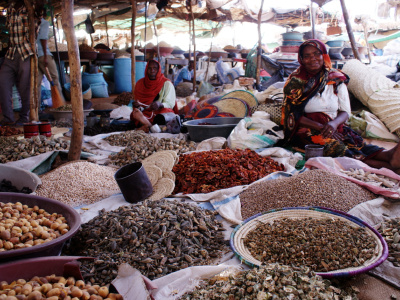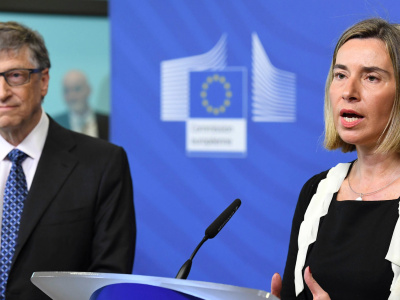
The Return of Industrial Policy in Africa
Industrial policy is rapidly advancing in the African continent. Development partners should support African governments to effectively promote the transformation of their economies with strategic tailor-made industrial policies that deliver inclusive and sustainable industrial development.
Industrial policy has experienced a revival and has reappeared as a central component of development strategies in Africa and beyond. For several decades, productive sector interventions were undervalued and proactive government involvement in the structural and industrial development of economies was largely discouraged. In the case of Africa, governments were even asked to withdraw considerably from the industrialisation process so as to enable market forces to shape development trajectories. Due to the widespread failures of this development strategy, industrial policy is back on the agenda today. In fact, governments in both industrialised and developing countries now see the strategic necessity of industrial policy to sustain growth through structural change.
African countries are at the forefront of this move, trying to give a nudge to the structural transformation of their economies regardless of their income level. On the one hand, low-income countries in the continent are striving to speed-up the shift from resource-based activities in agriculture and mining to more productive light manufacturing (of food, textiles, etc.). On the other hand, the middle income-countries in Northern and Southern Africa are placing their bets on industrial policy to upgrade their manufacturing sector and to compete globally in more technology-intensive, high-value added activities. Meanwhile, Regional Economic Communities (e.g. EAC, SADC, ECOWAS) are introducing industrial policies as an essential pillar of their economic integration strategies.
Clearly, the race for industrial success has begun in Africa. At the same time, the scope of strategic industrial policy is broadening beyond a narrow economic focus to also take into consideration social and environmental dimensions of industrialisation. The creation of quality jobs for the increasingly skilled youth requires significant efforts. Industry is also expected to provide opportunities not only in the traditional economic hubs but across regions, ethnicities, genders and age groups. Last but not least, it has to be considered how an adaptation of productive activities can enhance competitiveness whilst respecting global and national ecological limits. The key question for Africa today is therefore, how to best develop industrial strategies and policies which can promote a process of inclusive and sustainable industrial development.
Hence, development partners should leave behind the debate of whether or not industrial policy is necessary in Africa and start providing pragmatic solutions that make them as effective and efficient as possible. This support should start from the recognition that effective industrial policy requires highly competent technocrats alongside serious political and financial support. An important step in this direction was reached at the recent Africa-EU Summit on 2-3 April in Brussels where the two continents recognised industrialisation as a central priority for Africa’s development.
The new industrial policy revolution necessitates that countries respond to the specific and dynamic needs expressed by their manufacturing sectors with appropriately designed and targeted policies. In order to reach such policy coherence, African governments require strong industrial policy management capabilities in their endeavour to eliminate poverty
This is exactly the role of the United Nations Industrial Development Organization (UNIDO). It regularly holds the Conference of African Ministers of Industry (CAMI) which brings together policy makers and industrial experts to deliberate on industrial policies. In this context and at the request of the African Union, UNIDO has formulated, together with African Governments and the private sector, the “Action Plan for the Accelerated Industrial Development of Africa (AIDA)”, a strategy which aims at mobilising both financial and non-financial resources and enhancing Africa’s industrial performance. The AIDA is a central pillar of the new Africa’s strategy for 2063 and of the Africa-EU roadmap for 2014-2017.
UNIDO actively supports the development and execution of tailor-made regional industrial policies and strategies in all regions of Africa (EAC, CEMAC, SADC, ECOWAS and SACU). Some have already led to effective downstream activities. For instance, at the request of UEMOA and ECOWAS and the 16 countries of West Africa, UNIDO has established, with the support of the European Union, a fully operational accreditation system. It has also supported the industrial modernisation and upgrading of the private sector through large scale interventions in UEMOA countries on a model developed with the Agence Française de Développement in Senegal. Other regions are now following the same approach.
On the level of individual countries, UNIDO is deeply engaged with a growing number of countries across the continent. In lower income countries, its Strategic Industrial Intelligence and Governance programme has proven to be a well-suited service for strengthening the institutional capacities required for an evidence-based industrial strategy formulation process. Currently, the programme is being rolled-out in Cape Verde, Côte d’Ivoire, The Gambia and Tanzania.
In middle-income countries, UNIDO is building the capacity for other critical aspects in the industrial policy cycle. For instance, in South Africa, cooperation with the Department of Trade and Industry aims at a tailor-made Monitoring and Evaluation System that will provide strategic insights into the impact of major policy interventions, beginning with the massive Manufacturing Competitiveness Enhancement Programme (worth ZAR 5.8 billion).
In addition, some of UNIDO’s global initiatives on industrial policy also place a significant focus on the African context. A partnership with the German Government aims at enhancing the quality of industrial policies through the development and deployment of more effective industrial policy support services. UNIDO and Germany are strengthening the national industrial strategy formulation capabilities, facilitating an evidence-based policy dialogue between key public and private stakeholders, and advising governments on more effective approaches to policy design and implementation. In particular, a new industrial strategy design toolkit and capacity development package will address the specific practical challenges developing countries face when crafting industrial policies. The new service will be piloted in Africa in late 2014 on a regional level and subsequently rolled out jointly by UNIDO, Germany and other development partners on a country level.
In line with the joint UNIDO/UNCTAD Economic Development in Africa Report 2011, UNIDO continues to advocate for industrial policies which are practical, well-designed, context specific and based on extensive discussion with and feedback from businesses and entrepreneurs. It sees its role in supporting African endeavors to design and implement industrial strategies and policies through capacity development, strategic advice and facilitation services. To support this, a new Africa Investors Report elaborated by UNIDO in partnership with the European Union and the Africa, Caribbean and Pacific Group of States will be released in the next few weeks. This report based on investment surveys on the ground provides evidence on the status of 7,000 enterprises in 20 African countries.
In order to harness the full potential of industry to contribute to the global achievement of sustainable development and lasting prosperity for all, UNIDO is promoting the concept of inclusive and sustainable industrial development. To provide practical industrial policy solutions for this ambitious agenda in Africa and beyond, the Organization’s latest Industrial Development Report (IDR) 2013 looked specifically at ways to sustain employment growth in the manufacturing sector. In addition, UNIDO’s Green Industry initiative, a transformative multi-stakeholder partnership, addresses the issue of environmental sustainability and proposes a number of policies to promote green industry effectively. This includes measures for the greening of industries to ensure that all industries continuously improve their environmental performance as well as the creation of green industries that provide environmental goods and services.
Beyond the direct provision of these upstream industrial policy services to support the strategy and policy setting process, UNIDO continues to implement downstream technical cooperation projects for industrial development in almost all African countries in line with the strategic priorities and industrial policy frameworks of governments. It has been focusing on agribusiness and agro-industrial development, skills and entrepreneurship development, job creation, and industrial upgrading, and has been active in Africa in the area of trade capacity building, including support for the creation and upgrading of quality assurance infrastructure, the development of national quality policies, and fostering the compliance capacity for international market access. In the field of energy and the environment, UNIDO initiatives in Africa include a broad spectrum of activities, ranging from the Sustainable Energy for All (SE4ALL) initiative to the phase-out of chemicals that damage the ozone layer in line with the Montreal Protocol, as well as major climate action interventions at industry level in the framework of the Global Environment Facility.
The combination of both upstream and downstream industrial policy services puts UNIDO in a unique position to contribute to the effective deployment of strategic industrial policies in Africa in the future. To advance this agenda, two Fora a year will be organised in UNIDO Headquarters in Vienna in June and October that will bring together developing countries and development partners into practical partnerships for the implementation of industrial development policies and programmes at country level.
In line with the principles of the Paris Declaration on Aid Effectiveness and the Accra Agenda for Action, UNIDO’s work is driven by the belief that development partners should support the industrial policy process in developing countries with institutional capacity building for public policy rather than by aiming at specific policy content or outcomes. Hence, the real champions of the industrial policy revolution in Africa will be the public and private stakeholders that contribute to an evidence-based, participatory and effective industrial policy process that will deliver significant impacts for an inclusive and sustainable industrial development trajectory in Africa.
Li Yong is the Director General of the United Nations Industrial Development Organization (UNIDO.
This article was published in GREAT Insights Volume 3, Issue 5 (May 2014).




